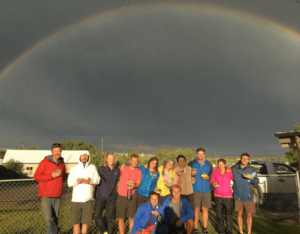
Hopping on a bike weighing 100 lbs, awaiting what would be a 700 mile trek across the Montana landscape with 13 other strangers is nothing short of an overwhelming experience. Coming from a background that stems heavily in the humanities and the social aspects of environmental studies and diving into a course that focuses mainly on the science and economics of energy use and climate change, I realized I had a long way to go, physically and mentally. Going into a course with only a very shallow knowledge base may seem intimidating at first, and trust me, it did, but with each day, my perspective widens, and my ideas intertwine into the climate change and energy issues in Montana. As the days go on, these ideas only get more complex. When searching for answers, complexity is often a disheartening conclusion, but with issues such as climate change and energy use, ones that so intensely weave through so many local, national, and global communities, complexity has a way of opening perspectives that bear heavily in empathy and a drive to change.
Our first stop on our trek was a ranch in Billings, Montana– owned by Alexis Bonogofsky and Mike Scott. Their land is along the Yellowstone River and includes fields of wildflowers, with goats, sheep, chickens, horses, a few dogs, and of course, a cat occupying the land. They were able to operate smoothly until 2011 when heavy flooding carried a large object down the river that collided with an Exxon oil pipeline, hurling approximately 2,400 barrels of oil downstream. Alexis awoke one morning to the surprise of a rainbow layer of oil floating atop the water, blanketing their land, trees, fields and all. Because of this devastation, Alexis and Mike felt compelled to seek justice for the sake of their ranch and the sake of their community. Mike explained to us that their efforts in bringing together community members to stand up to Exxon brought a newfound empathy. Going door to door, Alexis and Mike spoke to people of all backgrounds trying to bring together community members, differences aside, to fight for justice. In the end, not everyone agreed with this line of action, but those who did surpassed their differences enough to empathize with one another and were able to achieve their main goal. Mike repeated his emphasis on empathy throughout our discussion. He explained that not everyone you come in contact with will have the same reaction as you, meaning every person uniquely experiences life in a different way. Though the end goal may be similar, the thought processes and motivations behind those goals can be very different.
It’s been almost a week of biking with 150 miles behind us and a newfound comfort in the people who surround me. Our group is comprised of students from New York, Rhode Island, Virginia, Montana, Wisconsin and Japan, with each of us studying a variety of fields from chemistry to film to agricultural engineering. What’s brought us together is our passion of memes, dad jokes, and of course, the environment, which has connected us enough to work well as a team in every aspect of the word.
Mike’s concept of empathy was imprinted in my head, especially when visiting Signal Peak Coal mine a few days after leaving Mike and Alexis’ ranch. Going into this tour, my preconceived notion of a coal mine was that it would be dangerous and dirty, with employees unwelcoming to a group of young environmentalists. Instead, we were greeted with smiling, helpful faces, flashy safety reminders, and a very large trophy for winning a high end safety award. Byron, our tour guide and the manager of surface mining at Signal Peak, was bright eyed, proud, and ready to answer any questions we shot at him.
Signal Peak has been awarded the Sentinel Award in which Byron explained the pride they take in their safety, and that the last injury at the mine occurred over five years ago. Other miners explained their deep love for their families and why they are motivated to work hard every day and stay safe to be able to come home every night. A few employees told us they used this job as a way to pay for their education, support their families, or as a way to send their children to college. These motivators are similar to those of any young adult or parent, working hard to better themselves or their families. While driving to one of the sections of the mine, Steph, our TA, asked one of the employees about his favorite part of the job. His response was quick in sharing the relationships he has created with the other men at the mine, opening the window to wave to his buddies as we drove past. I could physically see the bond these men have created in their time with each other. This was something that I had not expected being stuck in my previous ideas surrounding the ways of a coal mine. This experience only complicated matters more. Every person is driven to live their lives in specific ways; for these men it was their families, education, and bettering themselves for their futures, and you can’t blame a man for wanting the best for the people they love.
It may be easier to think in terms that are blatantly black and white or right and wrong. But the issues that deal with the environment are nothing but colorful and complex. Accepting this complexity and learning to empathize with those who have differing opinions and backgrounds will only add to the confusion of what is ‘right’, but this confusion is a necessary step to begin putting the pieces together. We all have our motivations, and understanding that can help us begin to understand the energy issues in Montana, and even the world.